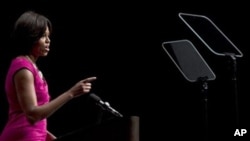As the U.S. midterm congressional elections grow nearer, President Barack Obama's wife, Michelle, is playing an increasingly important role campaigning for Democrats seeking to hold on to their seats in Congress. Appearances by the first lady across the country are aimed at helping to re-energize enthusiasm among Democrats, particularly women and youth voters, before Americans go to the polls on November 2.
Though Democrats and the White house have drawn some encouragement from what appears to have been a slight narrowing in key election races, they still face the prospect of losing control of at least one chamber of Congress on November 2.
A recent Reuters/Ipsos survey found that Americans would vote for Republicans rather than Democrats by 48 to 44 percent. That supports a scenario in which Republicans would win control of the House of Representatives. In some key Senate races, Democrat's chances have improved, reducing the threat of a Republican takeover of the Senate.
President Obama also faces continuing generally high disapproval numbers nationally, focused on his handling of the economy. Polls reflect concern voter concern about the 9.6 percent unemployment rate, and pessimism about the general direction of the country.
Into this picture steps First Lady Michelle Obama, making her first campaign appearances in two years. She is being deployed to key states where Democrats face tight contests. The first was in Wisconsin, to help Democrat Senator Russ Feingold hold on to his U.S. Senate seat.
"I think about how we all felt on [President Obama's] inauguration day," said Michelle Obama. "We were excited, we were energized, we were hopeful, we were fired up because we knew we had a chance to change the country we loved for the better."
Feingold asserted that he had pulled ahead in his race with Ron Johnson, a Republican businessman supported by the conservative Tea Party movement, though some polls show Johnson retaining a slight lead.
"As of this moment, I am no longer behind," exclaimed Russ Feingold. "I am no longer behind! And I can tell you that as of this moment, I am actually beating Ron Johnson, with the voters most likely to vote!"
It remains to be seen how Michelle Obama's appearance will help Feingold and other Democrats. She later went to Chicago, home town for the Obamas, to campaign for Alexi Giannoulias who is competing against a Republican for the president's former U.S. Senate seat.
"He [President Obama] needs leaders like Alexi, right by his side," said Ms. Obama. "And we need folks like all of you to make that happen. "
Michelle Obama also went to Colorado on Thursday, and will be on the road again in coming days. An appearance with the president on Sunday at a Democratic event in Columbus, Ohio, will be the first time the two will campaign together since 2008, when Mr. Obama battled Republican John McCain for the presidency.
The White House calls the first lady an invaluable asset. But aides emphasize she will not be wading deeply into the political thickets or get involved in day-to-day rhetorical battles with Republicans.
White House Press Secretary Robert Gibbs says she will employ her own personal story in her campaign appearances, and her sense of where Americans find themselves at this point.
"As she told during the 2008 election, she has got a story to tell about herself and her family and I think she will tell that story and what the [Obama] administration and some of these [Democratic] candidates have been able to do to help families that they represent," said Gibbs.
That approach, in which she incorporates Obama family experiences with the political message her husband and Democrats are trying to convey before November 2, was on display in Wisconsin.
Calling herself a "mom-in-chief" she connected what she called her first priority - making sure that the Obama's two daughters are "happy, healthy, and adjusting" to life in the White House - with challenges facing other American families.
"I come to this stuff [politics] more as a mom," she said. "And when I think about the issues that are facing our nation, I think about what it means for my girls. I think about what it means for the world that we are going to leave behind for them, and quite frankly for all of our children.
In campaign stops, the first lady refers to her husband by his first name, Barack, and echoes the president when she tells audiences that despite steps he has taken to respond to recession, economic improvements have been slow and "change is hard."
The 2008 campaign, Michelle Obama told voters in Wisconsin, was never about putting one man in the White House, but about "building a movement for change that lasts beyond one year and one campaign.
Michelle Obama Campaigns for Democrats in US Midterm Elections
- By Dan Robinson





